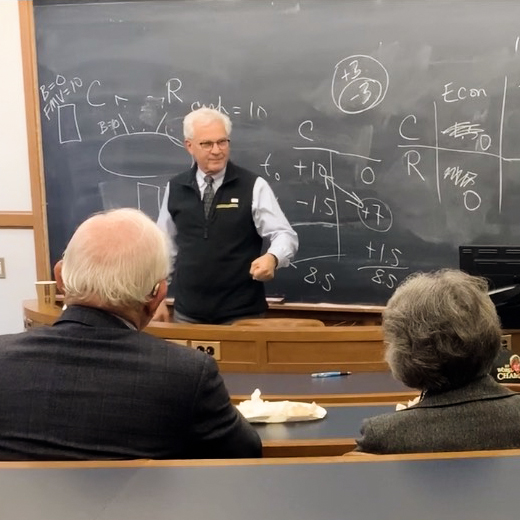
Alex Martin
Students and faculty members crowded into room 121 of the Sterling Law Building on Tuesday to listen to nuclear expert Joe Cirincione discuss nuclear dangers and the presidency of Donald Trump.
With decades of experience in national security and nuclear proliferation work, Cirincione currently serves as president of Ploughshares Fund, a global security grant-making foundation. He also hosts and produces national security podcast “Press the Button.” On Tuesday, he talked about the dangers posed by nuclear arms and the lack of attention these dangers receive from the public. The Trump Administration has exacerbated these threats, Cirinciones argued at the event.
“Nuclear weapons can destroy our world in an afternoon,” Cirincione began. “Yet they get almost no attention.”
Cirincione began the talk by listing nuclear problems and dangers. The first problem is the breakdown of deals for arms reductions in recent years, such as the Iran Nuclear Deal, Cirincione said.
“There used to be 70,000 nuclear weapons, mostly held by the U.S. and Russia,” he said. “Now we are down to 14,000, but these reductions have stopped. There are no more reductions being made, no more talks about reductions, not even any talks about talks about reductions.”
According to Cirincione, over $2 trillion is set to be spent on nuclear weapons over the next 25 years — a price tag far too high in his view. Beyond the cost, a failure to reduce nuclear capabilities threatens all, the speaker argued. The risk of war in South Asia between India and Pakistan is high, he noted, partially because of the threat of nuclear arms.
These are “two nuclear-armed nations that border each other, having already had four wars since independence,” he explained.
He said that most war games modeling the situation find that it ends in nuclear war.
“Beyond the specific arms races themselves, there is another wider risk — one of these leaders, stable or not, rational or not, can press the button and launch a nuclear weapon,” he explained. “The majority of them are controlled by autocratic leaders, but even in democratic countries, just one individual controls the fate of the planet.”
Cirincione went on to say that the Trump Administration has “thrown gas on the nuclear arms race fire.”
He said the Republican Party adopted a stance that was formerly a minority view within the GOP, that “arms control gives only an illusion of security, and that … good nations will abide by them while the bad nations will just cheat” on nuclear arms reduction agreements. This view — that only military might, rather than treaties — should control the future has resulted in the administration pulling out of international agreements, such as the Iran Nuclear Deal, Cirincione said.
“The last problem, and the most worrisome of all,” Cirincione said, is not limited to pulling out of treaties. It is “whether Trump will do something radical to prevent his impeachment trial.”
Nonetheless, Cirincione said he does see cause for celebration. He added that the travesties in the status quo are results of Americans’ desire for change.
In response to a student asking about Democratic candidates’ proposals for nuclear weapons, Cirincione said that their ongoing discussion gives him hope. All top Democrat candidates have pledged no first use, while Ted Lieu of the House of Representatives is advocating for Congress to have to approve any first use of nuclear weapons, the speaker added.
These legislative proposals all serve as a check on the president from acting as the sole decision-maker and ensure that other countries are not threatened or attacked at the president’s sole discretion, Cirincione said. In a 2017 talk, professor Nuno Monteiro, director of International Security Studies at Yale, said, “when facing an adversary that has nuclear weapons, the last thing you want to do is to get them to feel pushed against the wall.”
Jacob Madden LAW ’22, who said he attended the talk to learn about nuclear proliferation, said the discussion of current congressional proposals interested him the most.
In an interview with the News, Cirincione explained that the reason nuclear proliferation does not get as much attention is because it does not have an immediate or even gradual impact.
“Issues like discrimination and sexual assault, you see these things occurring,” he said. “You can see and feel climate change. Whereas all of the weapons and stockpiles are underground — we don’t see it and don’t think about it.”
Despite this lack of attention, he said college students on a recent episode of his podcast are taking action on their campuses. Across government, he sees positive improvements in conversation and action, the nuclear expert added.
Established in 1824, Yale Law School is located at 127 Wall St.
Alex Martin | alex.martin@yale.edu







